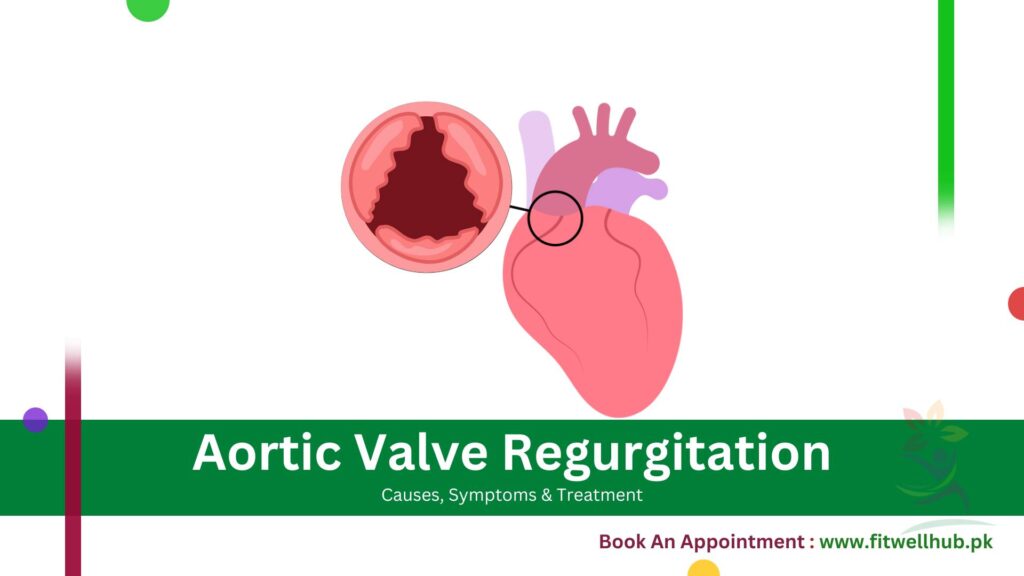Aortic valve regurgitation is a heart condition in which the aortic valve responsible for normal blood flow from the heart into the aorta, fails to close properly. This condition leads to a backflow of blood into the left ventricle instead of being adequately sent to the other parts of the body. Chest pain, shortness of breath, and fatigue are a few symptoms that arise due to the heart’s overwork to pump blood.
Quick Links
ToggleWith time, this overwork will lead to the enlargement of the size of the left ventricle and also weaken the heart muscles, which in turn may result in heart failure if timely intervention is not provided. Conditions such as increased blood pressure, aging, infections like endocarditis, and ailments like Marfan syndrome can also cause aortic valve regurgitation.
The effective treatment approach depends on the intensity, including medications to alleviate symptoms and surgical treatments like valve replacement or repair. Early detection and regular screening are important to stop serious complications and manage good heart health.
Symptoms
Aortic valve regurgitation can remain asymptomatic for years, especially when the leak is small. As the condition worsens, symptoms may become more noticeable and severe.
- Fatigue and weakness: As the heart cannot pump blood efficiently, a person may feel increasingly tired and weak, even with minor exercises.
- Shortness of breath: Due to inadequate blood flow throughout the body and fluid accumulation in the lungs. Individuals may experience difficulty breathing, especially during exercise.
- Swollen ankles and feet: Fluid accumulation in the lower limbs may lead to swellings due to poor blood circulation.
- Chest pain or discomfort: Some people may have chest tightness or pain, especially during physical exertion or in serious cases of regurgitation.
- Rapid or irregular heartbeat: The heart struggles to keep up with the backward blood flow. It may beat rapidly or irregularly, leading to palpitations.
- Lightheadedness or fainting: A sudden decrease in blood pressure or insufficient blood flow to the brain. It may cause dizziness or, in the worst cases, loss of consciousness.
- Heart palpitations: Some people may experience an uncomfortable sense of their heart beating. It is often described as fluttering, pounding, or skipping beats.
GET IN TOUCH
Book An Appointment
When to See a Doctor
It’s important to seek medical attention if you experience symptoms like shortness of breath, chest pain, or chronic fatigue. Early detection and treatment are important for avoiding serious complications because aortic valve dysfunction can lead to heart failure in serious cases.
At FitwellHub, expert cardiologists who are experienced in treating heart problems, such as aortic valve regurgitation, are ready to assist you. They provide accurate diagnoses and personalized treatment plans that meet your requirements. To schedule your appointment, visit FitwellHub and connect with our experts now.
Causes
It may result from several conditions affecting the aortic valve or its structures. These conditions can either cause the valve to weaken or become damaged over time.
- Age-related changes to the aortic valve: As people age, the aortic valve may become more rigid or calcified, making it less capable of closing properly, which leads to regurgitation.
- High blood pressure: The heart pumps the blood harder due to persistent high blood pressure, which causes additional strain in the aortic valve, resulting in significant malfunction with time.
- Aortic valve infections (endocarditis): Bacterial infections can damage the aortic valve, making it less effective at sealing off the left ventricle, resulting in regurgitation.
- Rheumatic fever: When strep throat is left untreated, it can cause deformity and scarring of the aortic valve, resulting in improper closure. Rheumatic fever, a complication of strep infections, causes long-term heart damage known as rheumatic heart disease (RHD). In Pakistan, RHD remains a leading cause of aortic valve problems, particularly among younger individuals.
- Congenital heart defects: Some people have a bicuspid aortic valve from birth in which only two flaps are present instead of three. This irregular structure may result in regurgitation because the stress on the valve increases with time.
- Aortic root dilation: When the size of the aorta’s section increases, present just above the valve (the aortic root), it can stop the valve from closing properly, causing blood leakage.
- Marfan syndrome: This genetic disorder weakens connective tissues throughout the body, including those that support the aortic valve, increasing the risk of regurgitation.
Risk Factors
Various risk factors can raise the possibility of regurgitation of the aortic valve. Every factor weakens the aortic valve or even impacts the overall functioning of the heart.
- History of heart infections: Diseases such as rheumatic fever or endocarditis can affect the aortic valve, increasing the chances of regurgitation.
- Connective tissue disorders: Blood leakage usually results from conditions such as Ehlers-Danlos syndrome or Marfan syndrome because they damage the integrity of the aortic valve.
- Previous heart surgery: People who have experienced heart valve surgery may be at higher risk for developing this condition later in life.
Complications
Aortic valve regurgitation may result in severe complications if not treated well. These complications can seriously affect the complete heart health and function.
- Heart failure: This complication is due to overwork of the heart to pump blood to cover the blood loss due to reversed blood flow.
- Arrhythmias: The blood flow caused by regurgitation can lead to abnormal heart rhythms (arrhythmias), which may require medical intervention.
- Endocarditis: People with aortic valve regurgitation are at higher risk for developing infections of the heart’s lining and valves, known as endocarditis.
- Pulmonary hypertension: Persistent regurgitation can increase the pressure in the lungs, a condition known as pulmonary hypertension, which can lead to more complications.
- Left ventricular hypertrophy: As the left ventricle works harder to pump blood, it can become enlarged (hypertrophy), which increases the risk of heart failure.
Prevention
Aortic regurgitation may be prevented by adopting certain healthy lifestyle activities and controlling the major risk factors. A few prevention methods are:
- Control blood pressure: Controlling blood pressure with physical activity, nutrition, and medication can minimize the pressure on the aortic valve and thus the risk of regurgitation.
- Treat infections timely: Most throat infections, including strep throat, must be managed properly to avoid secondary infections like rheumatic fever, which causes a lot of damage to the aortic valve.
- Routine check-ups: Regular cardiovascular exams can help detect heart valve problems early, allowing for timely intervention.
- Avoid tobacco use: Smoking leads to many heart-related conditions that damage the blood vessels and raise the chances of developing aortic valve diseases. Quitting smoking can assist in preventing complications.
- Heart-healthy diet: Eating a balanced diet rich in fruits, vegetables, whole grains, and lean proteins helps maintain heart health and prevent valve issues.
FitwellHub offers the Healthy Elite Lifestyle Program, which can help you prevent cardiovascular diseases and maintain good heart health.
Diagnosis
The diagnosis of aortic valve regurgitation involves medical history, physical examination, and specific heart tests. The following are some of the diagnostic tests that are usually practiced:
| Test | Purpose |
|---|---|
| Echocardiogram | Visualizes the function and structure of the aortic valve and examines the intensity of regurgitation. |
| Electrocardiogram (ECG) | Measures the heart’s electrical activity to identify rhythm disorders due to regurgitation. |
| Chest X-ray | Detects increased heart size, a common sign of aortic valve regurgitation. |
| Magnetic Resonance Imaging (MRI) | Provides detailed images of the heart to examine the aortic valve function more thoroughly. |
| Cardiac Catheterization | Measures blood flow and assesses the extent of valve damage by inserting a catheter into a blood vessel. |
FitwellHub provides state-of-the-art diagnostic facilities to ensure accurate testing and comprehensive evaluation of heart valve disease. To book your test, visit our lab.
Treatment
Treatment of aortic valve regurgitation depends on its intensity and symptoms. Here are some effective treatment approaches:
- Medications: Certain medicines lower blood pressure, reducing stress on the aortic valve and helping manage symptoms to prevent further damage.
- Diuretics: These medicines help decrease fluid accumulation in the lungs and other body parts, which can alleviate regurgitation symptoms.
- Valve repair or replacement surgery: In severe cases, surgeons may need to repair or replace the damaged aortic valve.
Medications
Medicines can be used to control and delay the symptoms of aortic valve regurgitation. A few common medications are:
- ACE inhibitors: These medications help relax blood vessels, reduce blood pressure, and improve blood flow, easing the burden on the heart.
- Beta-blockers: By slowing the heart rate, beta-blockers help the heart pump more efficiently, reducing the symptoms of regurgitation.
- Calcium channel blockers: These medications also help lower blood pressure and reduce the strain on the aortic valve.
FitwellHub’s Pharmacy Services offers a range of medications for managing heart valve diseases. Visit our pharmacy, and experience the convenience of online ordering.
GET IN TOUCH
Book An Appointment
Frequently Ask Questions (FAQ’s)
If left untreated, it can cause potentially life-threatening complications, including heart failure, arrhythmias, pulmonary hypertension, or endocarditis.
No, minor cases are usually treated with medications and lifestyle adjustments, but severe cases in which the symptoms get worse usually require surgery.
Yes, especially if congenital defects or rheumatic heart disease cause its development, which is common in the young populations of countries like Pakistan.
Medicines including beta-blockers, diuretics, and ACE inhibitors are used to alleviate symptoms, prevent blood pressure from increasing, and slow disease progression.
Lifestyle changes like quitting smoking, a healthy diet, and regular exercise can help improve heart health, but medical intervention is usually crucial in more serious cases.














